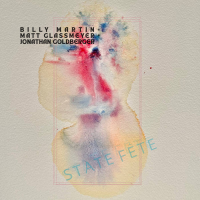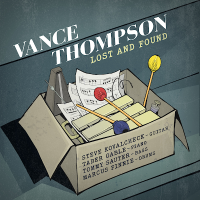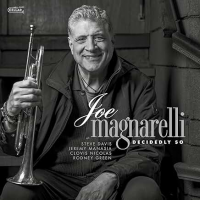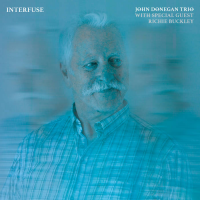Home » Jazz Articles » Extended Analysis » Monty Alexander: Monty Alexander: We've Only Just Begun
Monty Alexander: Monty Alexander: We've Only Just Begun
 Monty Alexander Trio
Monty Alexander Trio We've Only Just Begun
Universal
2006
Pure and simple, the hardest swinging session on record. Of course, what Duke Ellington meant by his famous criterion concerning swing is as debatable as Louis Armstrong's evasive definition of jazz. But if the listener's idea of "swing" goes beyond time-keeping, or a synchronized pulse, or an empathetic "vibe," or even a forceful drive, and insists rather on the presence of a deep and unshakeable "groove," this Monty Alexander on-location trio session, captured at a Buffalo, New York motel on December 1, 1971, must stand at the head of the class.
While it's unlikely any pianist could dig deeper grooves than the Oscar Peterson Trio, Alexander frequently came close, as this video with bassist Ray Brown demonstrates. Moreover, the young Jamaican pianist had a canny knack for pausing just long enough to make certain the listener was with him for every reeling moment of the wild ride. Whereas a Peterson performance can be impressive if not overwhelming, a Monty Alexander set can be at once exhilarating and communicative, moving listeners while getting them to move.
 Fortunately, some of the pianist's sterling work on Germany's MPS label is finally being reissued for domestic import (with notes in Japanese). Even before teaming up in 1976 with drummer Jeff Hamilton and bassist John Clayton (later Ray Brown) for some of his most highly regarded trio work, Alexander was capable on any given night of playing like a man possessed—in other words, like a young, physically conditioned, Listzian pianist, equal parts polished musician and indefatigable daredevil.
Fortunately, some of the pianist's sterling work on Germany's MPS label is finally being reissued for domestic import (with notes in Japanese). Even before teaming up in 1976 with drummer Jeff Hamilton and bassist John Clayton (later Ray Brown) for some of his most highly regarded trio work, Alexander was capable on any given night of playing like a man possessed—in other words, like a young, physically conditioned, Listzian pianist, equal parts polished musician and indefatigable daredevil.
Not that he doesn't receive strong support on the present occasion. Bassist "Senator" Eugene Wright had recently enjoyed visibility with pianist Dave Brubeck's "Take Five" Quartet, and drummer Bobby Durham, despite his deceptive size, was a "man of steel," the kind of percussion-athlete that Oscar Peterson, not surprisingly, called upon repeatedly. But on this wintry night the younger pianist will push both players to their limits, requiring them, on the one hand, to be human earthmovers carving out a visceral 4/4 groove and, on the other, to be alert to his constant change-ups. Alexander, like film-maker Alfred Hitchock, thrives on suspense and surprise, forever challenging the listener to anticipate his next move, whether a mid-stream shift in key, rhythm, tempo, texture, chord progression, or even song form.
 The first selection, the Jimmy Van Heusen standard "It Could Happen To You," is, at nearly fourteen minutes, the killer track on the album. In literature, a reading technique called "reader response" asks readers to abandon the role of passive recipient and to become the active reader not "of" the text but "in" the text, identifying with the characters and author while endeavoring to think and feel just as they. The same principle applies in movies and music. A "listener-response" analysis can suggest what it's like to jump on board the Alexander express, taking a seat alongside the musicians as a kind of invisible double, or fourth member of the ensemble, and keeping a mental journal while experiencing the ride.
The first selection, the Jimmy Van Heusen standard "It Could Happen To You," is, at nearly fourteen minutes, the killer track on the album. In literature, a reading technique called "reader response" asks readers to abandon the role of passive recipient and to become the active reader not "of" the text but "in" the text, identifying with the characters and author while endeavoring to think and feel just as they. The same principle applies in movies and music. A "listener-response" analysis can suggest what it's like to jump on board the Alexander express, taking a seat alongside the musicians as a kind of invisible double, or fourth member of the ensemble, and keeping a mental journal while experiencing the ride.
The familiar tune starts out innocuously enough—an out-of-tempo, lush reprise of all but the last four measures of the ballad by the pianist followed by a tempo recalulation, then a medium-up rundown of the entire 32-bar tune by the trio, with Wright's bass and Durham's brushes finessing a bright two-step. But as we approach the end of the tune, with four bars to go, the pianist subverts closure and disrupts song-structure, beginning a crescendoing eight-bar tremulo on the dominant (V7) chord at measure 28, with Durham staying with brushes until the very last measure, just enough time for the deft drummer to re-arm, draw wood, and crash! the procession is in high gear, Wright pounding pavement in 4/4, Durham sizzling tight on the ride cymbal, and Alexander dancing merrily ahead as the irrepressible leader of the pack.
At measure 28 of the next two choruses the pianist again transforms the dominant into an eight-bar suspension chord, eluding closure while disguising the cadence and maintaining suspense through each 36- bar cycle. The fourth time around begins with Alexander moving to block chords and taking off his gloves for an exchange of rhythmic jabs with Durham. After the pianist and newly aroused percussionist engage in some musical pugilism, the return of the same V7 suspended chord at measure 28 prompts the pianist to stay with it for an extended portion of Miles Davis' "Milestones," Durham by now so jacked that his left foot is playing the hi-hat on four (chink/chink/chink/chink), a coordinated drill team with Wright's inseparably linked bass. Now we're a long way from home—the pianist content to explore the free and open possibilities of a pure V7 suspended chord (mixolydian mode), eschewing chord changes in favor of taunting his percussive partner Durham, using off-the-beat accents, space, and repetition to nearly put the drummer and certainly the listener on the ropes.
Suddenly the champ moves to definitive, admonitory chords signaling a "genuine" dominant and return to the original tune for the out chorus. But this is Monty Alexander, the Alfred Hitchcock of the piano: the pronounced and prolonged dominant falls just short of the tonic, returning us to the mixolydian mode but one-half step up from the original key. The tonal center continues to shift, moving upwards and, besides the suspense and tension, implying an increase in tempo—until the release in the form of a return to the "home" key and the out chorus.
But again, this is Monty Alexander. In Psycho, Hitchcock caused gasps in theaters throughout the world when he had his leading actress (Janet Leigh) bumped off at the half way mark of the film. In Buffalo on this cold and snowy December night, the musical director isn't about to allow his listener the comforts of home—or of closure. At measure 28 of the 32-bar tune, with the crowd ready to reward the pianist for a remarkable, already exhausting performance, Alexander calls the Senator's number at 5 minutes 51 seconds into the song.
 The bassist, who had no doubt been relieved to be able to resume the two-beat feel of the original tune, now does his best to match the indefatigable leader, turning in some energetic finger dexterity before returning to the beaten path and walking it upwards to its narrow end, where the pianist rejoins him in stride at 6 minutes 58 seconds, presumably to take the tune out for real this time. But on this night the reward goes to the listener who's learned to expect the unexpected. Once again the last four measures produce not a cadence but a C suspended chord and another extended solo in mixolydian. Soon the pianist issues repeated crisp, irregular, full-chorded percussive shots, aimed at Durham, who at 8 minutes 37 seconds has the stage to himself. At 9 minutes 29 seconds, just enough time to regain blood flow in the arms and fingers, Alexander reclaims his ground and is again running in high-octane mixolydian mode. The pianist again shifts tonal centers, employing polyrhythmic patterns while remaining in wide-open harmonic space, no end in sight.
The bassist, who had no doubt been relieved to be able to resume the two-beat feel of the original tune, now does his best to match the indefatigable leader, turning in some energetic finger dexterity before returning to the beaten path and walking it upwards to its narrow end, where the pianist rejoins him in stride at 6 minutes 58 seconds, presumably to take the tune out for real this time. But on this night the reward goes to the listener who's learned to expect the unexpected. Once again the last four measures produce not a cadence but a C suspended chord and another extended solo in mixolydian. Soon the pianist issues repeated crisp, irregular, full-chorded percussive shots, aimed at Durham, who at 8 minutes 37 seconds has the stage to himself. At 9 minutes 29 seconds, just enough time to regain blood flow in the arms and fingers, Alexander reclaims his ground and is again running in high-octane mixolydian mode. The pianist again shifts tonal centers, employing polyrhythmic patterns while remaining in wide-open harmonic space, no end in sight.
Suddenly amid the maelstrom the pianist reaches into the soundboard and strums the piano strings, then plays the dominant note (C) in his left hand, and at 11 minutes 37 seconds we're back to the out chorus again—certainly for the last time. But by now everybody in the room must know better. The last four measures bring no cadence but the pianist in full flight once again on "Milestones." Then the trickiest of maneuvers—an acoustic fade-out, followed by the unaccompanied rubato piano of the opening, but this time playing only the melody's elusive final four bars— their first appearance of the night! Between the piano's freely playing the first 28 bars of the tune and now the same for measures 29-32, it's as though the intervening thirteen minutes couldn't possibly have happened, except for the listener's exhausted state offering evidence to the contrary.
At least the pianist, whose youth and strength may have stretched human limits, had enough sense to open rather than attempt to close his set with this ball-buster. One can only hope that the Senator was able to answer his house call the following night.
 The rest of the album is a fairly conventional (for Alexander) set. He lets Michel Legrand's "Summer Of '42 Theme" speak entirely for itself, and conjures up some engaging reggae action on his own "Monticello" as well as Henry Mancini's "Love Story Theme," demonstrating that he's one of the few musicians who can take pop ephemera and make it sound fresh as the new day. Perhaps there's no better illustration of such inventiveness than his treatment of the Carpenters-hit title song. His rich middle-range voicings contrasting with his use of the extreme registers for exotic, percussive effect; his constantly varying dynamics; his ability to use silence to optimal effect place him in the same company as a tonal colorist like Ahmad Jamal.
The rest of the album is a fairly conventional (for Alexander) set. He lets Michel Legrand's "Summer Of '42 Theme" speak entirely for itself, and conjures up some engaging reggae action on his own "Monticello" as well as Henry Mancini's "Love Story Theme," demonstrating that he's one of the few musicians who can take pop ephemera and make it sound fresh as the new day. Perhaps there's no better illustration of such inventiveness than his treatment of the Carpenters-hit title song. His rich middle-range voicings contrasting with his use of the extreme registers for exotic, percussive effect; his constantly varying dynamics; his ability to use silence to optimal effect place him in the same company as a tonal colorist like Ahmad Jamal.
The pianist pulls out one more blockbuster, this time going right at Oscar Peterson with Frank Loesser's "I've Never Been In Love Before." At eight minutes thirty seconds it's another fiery, kinetic performance, but on this night the leader clearly went for broke early, shooting his wad (wisely) on the opening tune. Few pianists, including Alexander himself, could top it.
The audio of this first-time digital transfer is "good" to "very good." In making A-B comparisons between the vinyl LP and the CD, I've had to roll back the bass by 45 degrees and the treble ahead by the same to replicate the balance of the original. Acoustic piano sound can be very subjective (witness the debates about whether Van Gelder's is a "true" piano sound ). To my ears, Alexander's tones are richer, warmer, more complex in analog than digital format. But however you find this recording, take note.
Tracks: It Could Happen To You; Summer Of '42 Theme; Monticello; We've Only Just Begun; I've Never Been In Love Before; Love Story Theme; Blue Alexander.
Personnel: Monty Alexander: piano; Senator Eugene Wright: bass; Bobby Durham: drums.
Personnel
Monty Alexander
pianoAlbum information
Title: Monty Alexander: We've Only Just Begun | Year Released: 2007 | Record Label: Universal Music Group
Tags
PREVIOUS / NEXT
Support All About Jazz
 All About Jazz has been a pillar of jazz since 1995, championing it as an art form and, more importantly, supporting the musicians who make it. Our enduring commitment has made "AAJ" one of the most culturally important websites of its kind, read by hundreds of thousands of fans, musicians and industry figures every month.
All About Jazz has been a pillar of jazz since 1995, championing it as an art form and, more importantly, supporting the musicians who make it. Our enduring commitment has made "AAJ" one of the most culturally important websites of its kind, read by hundreds of thousands of fans, musicians and industry figures every month.























